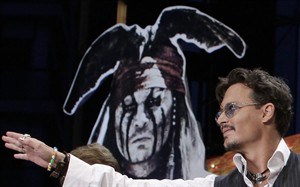
FILE - In this July 17, 2013 file photo, actor Johnny Depp waves for fans during the Japan premiere of his film "The Lone Ranger," with an image of him in the role of Tonto at rear, in Tokyo. A group of American Indian actors walking off the set of an Adam Sandler movie has sparked a debate over why Native American stereotypes in media have endured. It also shows that more Native Americans are voicing their opinions. This week, eight Indian actors quit the northern New Mexico production of the satirical Western "The Ridiculous Six" over complaints about offensive names and religious scenes.(AP Photo/Azusa Uchikura, File)
Republished April 24, 2015 - 4:05 PM
Original Publication Date April 24, 2015 - 1:20 PM
ALBUQUERQUE, N.M. - When a group of American Indian actors walked off the set of an Adam Sandler movie this week, their decision generated praise and scorn on social media.
But everyone agreed on one thing: Despite growing awareness, outdated Native American stereotypes in Hollywood remain. And more Native Americans are voicing their opinions.
This week, eight actors quit the production of the satirical Western "The Ridiculous Six" over complaints about offensive names and religious scenes. The actors said they couldn't participate in a movie depicting a Native American woman urinating while smoking a peace pipe.
California writer Megan Red Shirt-Shaw, founder of Natives in America, an online publication for Native American youth, said the walkout generated praise from American Indian advocates because people were tired of the images and now have outlets to express their outrage.
"In the past, Native actors did speak out but they didn't have the technology to share their views widely," Red Shirt-Shaw said. "It's different now."
On social media, activists used the hashtag #NotYourHollywoodIndian to denounce Sandler's project and to thank the actors for their "bravery."
Meanwhile, other Native Americans say more actors and writers are needed in media to battle hurtful images. They argued the actors should have stayed on set.
The Sandler film is set for a Netflix-only release, and the streaming service says it was designed to lampoon stereotypes popularized in Western movies.
A spokesman for Sandler's Manchester, New Hampshire,-based production company, Happy Madison Productions, didn't immediately return a phone message.
In recent years, Native Americans have been more outspoken.
For example, in 2013, some Native Americans were critical of Johnny Depp's portrayal on Tonto in the Disney version adaptation of "The Lone Ranger." Depp spoke in broken English, chanted prayers and wore a stuffed crow on his head. However, after a campaign by the movie to improve its image with Native Americans, Depp was eventually embraced on the Navajo Nation and was later adopted into the Comanche Nation.
A year before, the band No Doubt was forced to apologize and pull the music video "Looking Hot" after lead singer Gwen Stefani was criticize for dancing around teepees and wearing a series of American Indian-styled outfits.
Elise Marubbio, an American Indian Studies professor at Augsburg College, said those stereotypes are part of the nation's mythical West narrative and usually centre on images of the Lakota, the last tribe defeated by U.S. government forces.
But often those Lakota characters of the Great Plains are portrayed living in Monument Valley on the Navajo Nation of the American Southwest, Marubbio said.
That portrayal has changed little since the 1930s and seems to give some a justification to disrespectfully use American Indian clothing and practices.
Goldie Tom, a female actor who walked off the Sandler production, said she knew the movie wasn't going to be historically accurate, but she thought it would be tasteful.
"I don't regret my decision to be in the movie," Tom said. "But after this experience, I'm reminded that we still have work to do."
___
Follow Russell Contreras at http://twitter.com/russcontreras
News from © The Associated Press, 2015